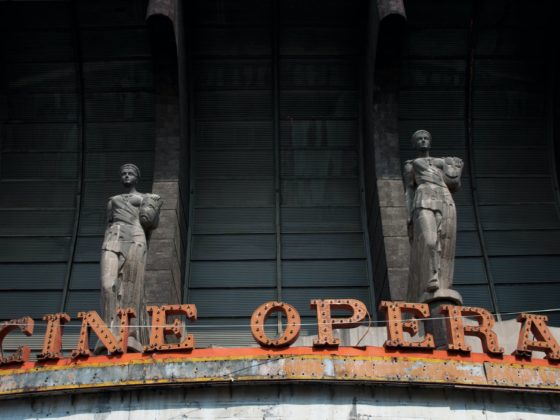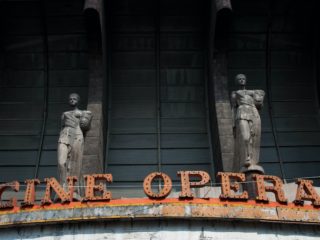Contemporary theatre in Romania
Before getting to know some of the most acclaimed contemporary Romanian playwrights it is important to know that in communist Romania, the theatre—as one of the most political art forms—had to undergo strict censorship, and it was dominated by a repertory that needed to emphasise a clear ideology. However, playwrights and directors tried to use metaphors and symbols to express their views and surpass the restrictions.
December 1989 saw Romanian theatre free from ideological control, and artists started experimenting freely with various methods and techniques. While most Romanian theatres are still state subsidised, with permanent companies employed, many strong, independent theatres have emerged, especially after 2000.
Now, more than ever, artists are drawn to talk about the flaws of a world caught in the middle of changes, in an attempt to become the conscience of the society. Re-discovering Romania’s recent past and how society copes with it is one of contemporary theatre’s most important current trends. And here are some contemporary Romanian playwrights whose works you might want to get aquatinted with.
Matei Vișniec
Born in 1956 in Rădăuți, Vișniec studied history and philosophy before dedicating himself to theatre. In 1987 he left Romania to settle in Paris, and thus he holds dual citizenship. After 1990, Vișniec became the most performed dramatists in Romania, and is, probably, the most renowned contemporary Romanian playwright at the moment.
Besides theatre, Vișniec’s work includes novels and poetry, and he is also an acclaimed journalist. In his plays—which have been translated into more than 30 languages and have been staged all over the world—he focuses on the contemporary man facing the crisis of communication, self-indulgence, anguish, alienation, expectation, resignation and death. Following in the footsteps of Ionesco, Vișniec’s most famous plays to date are The Body of a Woman as a Battlefield in the Bosnian War, The Story of the Panda Bears told by a Saxophonist who has a Girlfriend in Frankfurt, How To Explain The History Of Communism To Mental Patients, A Paris Attic overlooking Death.
Gianina Cărbunariu
Playwright, director, and theatre manager Gianina Cărbunariu (b. 1977) is also the co-founder of DramAcum group, a project aimed at getting in touch with the young playwrights and explore the work between director and playwright and also the play’s relation to the world. She is also one of the youngest and most successful contemporary Romanian playwrights.
Cărbunariu debuted in 2004 with Stop the tempo, a successful play that has been staged numerous times all over Europe. Her next successful project, Kebab, was written while being a playwright in residence at the Royal Court Theatre in London. These two first plays are seen as emblematic for her entire work, which focuses on identity and community in the contemporary Romanian society and the disruption between the child and the adult, the representation of home and what it means to be away. Other successful plays include Fastforewordrewind, Mihaela, the Tiger in Our City, Metro Everywhere, For Sale, etc.
András Visky
Born in 1957, Visky is a playwright, poet, essayist and the resident dramatist and associate artistic director at Cluj-Napoca Hungarian Theatre. His plays focus on what he calls “barrack dramaturgy”, inspired by his family’s experience with deportation and forced labour. In 1958, Visky’s father, a minister of the Hungarian Reformed Church in Transylvania, was sentenced to 22 years in prison and forced labor by the Romanian Communist authorities for “the crime of organisation against socialist public order”, while his wife and seven children—including András— were also deported in one of Romania’s largest deportations, undertaken in the ’50s.
It is no wonder, then, that in his works he returns again and again to what it means to be a prisoner and the problem of freedom. His most renowned plays, staged all over the world, include Juliet, I Killed My Mother, Disciples, Alcoholics, Born for Never or Backborn, The Long Friday, Porn, and Caravaggio Terminal.
Alina Nelega
Born in 1960, Alina Nelega is one of the most successful contemporary Romanian playwrights working at the moment, she is also a director, novelist and drama professor at the University of Arts in Târgu Mureș. Her award-winning plays have been performed, published or translated in Romania and many other countries.
One of her most successful works to date is Amelia Takes a Deep Breath, a brilliant one woman show about the destiny of Romania from the ’60s until early 2000s, told through the voice of Amalia, a woman living in this turbulent period and seen during various stages of her life—a teenager (the infamous communist pioneer), mother, and old woman. Other noteworthy plays by Nelega include Kamikaze, www.nonstop.ro, Graffiti.Drimz, In Traffic.
Saviana Stănescu
Romanian-American playwright, poet and professor, Saviana Stănescu’s plays have been widely performed internationally, and usually focus on strong female characters, Eastern European immigrants and the pursue of the American Dream.
While quite successful as a poet and playwright even before leaving Romania in 2001, Saviana Stănescu (b. 1967) gained notoriety in USA, where she received numerous accolades for her work. Among her most important plays are The Inflatable Apocalypse, Aliens with Extraordinary Skills, Black Milk, What Happens Next, For a Barbarian Woman, Lenin’s Shoe, Waxing West and many others.
Andreea Vălean
Playwright and director Andreea Vălean (b. 1972), is one of the co-founders of the before mentioned DramAcum group, who enjoyed tremendous success with her most famous play If I Want To Whistle, I Whistle which premiered in 1998, and was later turned into the Berlinale Silver Bear-winning film by director Florin Șerban in 2010, thus allowing her to delve into script writing as well.
In her plays, Andreea Vălean focuses on people whose stories aren’t often performed—juvenile offenders in prisons, Roma children in remote villages, Jewish people sold by Ceaușescu to the State of Israel in the ’70s, prostitutes on the Bucharest beltway or priests expelled from the Romanian Orthodox Church. Other notable plays by Vălean include Conspiracy in the Synagogue, Kiki and Bozo, The Corect Price / Sold Jews, Ciorica / Caravane of Dreams.
Featured image: still from “Caravaggio Terminal” by István Biró for The Hungarian Theatre of Cluj











